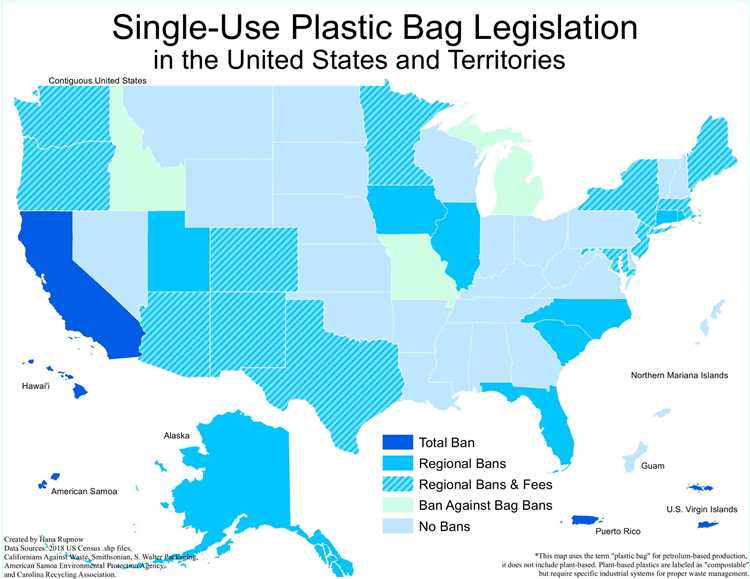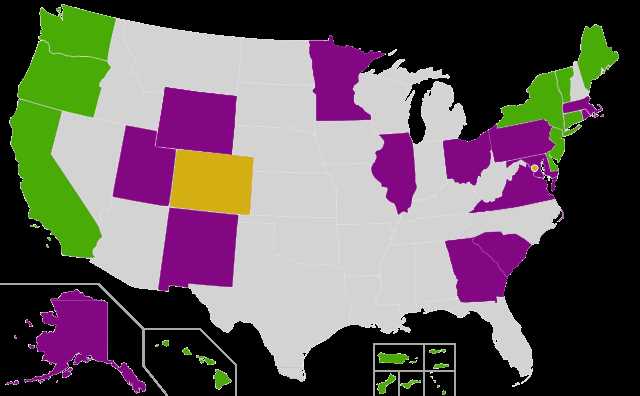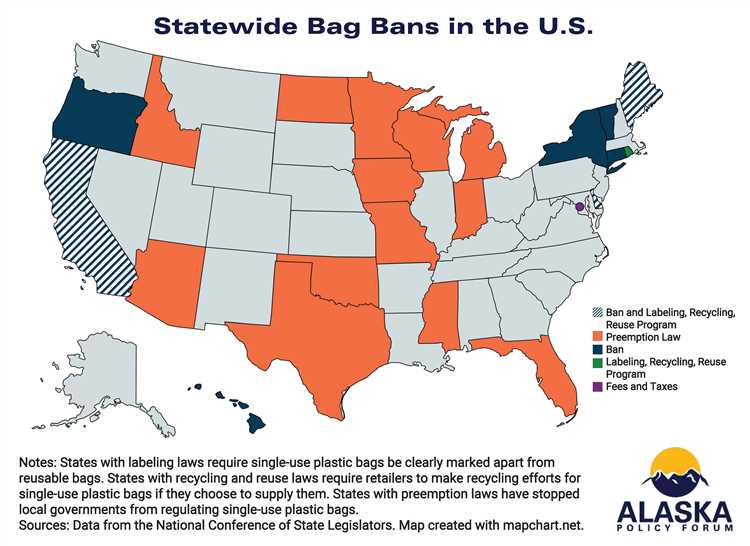In recent years, the environmental impact of plastic bags has become a major concern for many states in the United States. In an effort to reduce plastic waste and promote a more sustainable future, several states have taken the bold step of banning plastic bags altogether. These bans not only aim to protect the environment, but also to encourage individuals and businesses to adopt more eco-friendly alternatives.
One of the first states to lead the charge was California, which implemented a statewide ban on single-use plastic bags in 2014. This pioneering move set a precedent for other states to follow, and many have since taken similar action. Hawaii was the next state to join the cause, implementing its own ban on plastic bags in 2015. With its unique ecosystem and delicate marine life, Hawaii recognized the need to protect its natural environment from the harmful effects of plastic pollution.
As of now, there are a total of 11 states in the US that have implemented plastic bag bans. In addition to California and Hawaii, other states include New York, Oregon, Connecticut, Delaware, Maine, Vermont, Massachusetts, Rhode Island, and New Hampshire. Each of these states has its own unique reasons and motivations for implementing the ban, but all share the common goal of reducing plastic waste and promoting a more sustainable future for generations to come.
While the bans vary in their specifics, they generally prohibit retailers from providing plastic bags to customers and encourage the use of reusable alternatives, such as cloth bags or paper bags made from recycled materials. These bans have not only sparked a shift in consumer behavior and increased awareness about the harmful effects of plastic pollution, but also served as a catalyst for innovation in the bag industry, with the development of new, more eco-friendly materials and designs.
As the movement to ban plastic bags continues to gain momentum, more states are considering similar action to protect their natural environments and reduce their carbon footprint. By taking proactive measures to address the problem of plastic waste, these states are leading the way towards a greener, more sustainable future.
- Current status of plastic bag bans in the United States
- Comprehensive Plastic Bag Bans
- Partial Plastic Bag Bans
- Benefits of banning plastic bags
- 1. Reduction in Plastic Pollution
- 2. Preservation of Wildlife
- 3. Conservation of Resources
- 4. Promotion of Sustainable Alternatives
- 5. Financial Savings
- States with a complete ban on plastic bags
- California
- Connecticut
- Hawaii
- Maine
- New York
- States with partial bans on plastic bags
- Oregon
- New York
- Question-answer:
- Which states have banned plastic bags?
- Are there any penalties for using plastic bags in these states?
- What are the reasons behind banning plastic bags?
- How do states enforce the plastic bag ban?
- Do states that have banned plastic bags provide any exceptions?
- Which states have banned plastic bags?
Current status of plastic bag bans in the United States
As of 2021, several states across the United States have implemented plastic bag bans or restrictions in an effort to reduce plastic waste and promote sustainability. These bans vary in their scope and effectiveness, with some states implementing partial bans on specific types of bags, while others have enacted comprehensive bans on all single-use plastic bags.
California was the first state to implement a statewide ban on single-use plastic bags in 2014. Since then, other states and municipalities have followed suit, recognizing the environmental impact of plastic bags and the need for sustainable alternatives.
Comprehensive Plastic Bag Bans
Several states have implemented comprehensive bans on single-use plastic bags, prohibiting their use in most retail establishments. These states include:
- California
- New York
- Hawaii
- Oregon
- Maine
- Vermont
- Connecticut
These bans typically require retailers to provide customers with reusable or recycled paper bags or sell them at a nominal fee. The aim is to encourage consumers to bring their own reusable bags and reduce their reliance on single-use plastics.
Partial Plastic Bag Bans
In addition to states with comprehensive bans, several states have implemented partial bans on specific types of plastic bags. These bans often target thinner, single-use plastic bags typically provided at grocery stores. While these bans may not be as comprehensive as full bans, they still aim to reduce plastic waste and encourage the use of more sustainable alternatives. States with partial bans include:
- Colorado
- Delaware
- Massachusetts
- Oregon
- Rhode Island
- Washington
It’s important to note that the status of plastic bag bans is constantly evolving, with new legislation being proposed and implemented regularly. It is advisable to check with local authorities or retailers for the most up-to-date information on plastic bag regulations in your area.
Benefits of banning plastic bags
The decision to ban plastic bags has numerous benefits for both the environment and society as a whole. Here are some of the key advantages:
1. Reduction in Plastic Pollution
Plastic bags are a major source of pollution, especially in water bodies. They contribute to marine pollution, damaging ecosystems and harming marine life. By banning plastic bags, we can significantly reduce the amount of plastic waste that ends up in our oceans and rivers.
2. Preservation of Wildlife
Many animals, especially marine species, mistake plastic bags for food and end up consuming them, causing severe harm and even death. By eliminating plastic bags from our environment, we can help protect vulnerable wildlife and ensure their survival.
3. Conservation of Resources
Plastic bags are made from petroleum, a non-renewable resource. By banning them, we can conserve these valuable resources and reduce our dependence on fossil fuels. This move towards sustainable alternatives promotes a more responsible use of resources.
4. Promotion of Sustainable Alternatives
The ban on plastic bags encourages the use of reusable bags and other sustainable alternatives. By switching to these options, we can reduce waste, save resources, and promote a culture of environmental consciousness.
5. Financial Savings
Banning plastic bags can have economic benefits as well. Municipalities and governments spend significant resources on waste management, including the disposal of plastic bags. By reducing the use of single-use plastics, we can reduce these costs and allocate resources to other important areas.
In conclusion, the decision to ban plastic bags brings about a range of benefits, from protecting ecosystems and wildlife to promoting sustainability and saving resources. By taking this step, we can make a significant positive impact on our environment and create a more sustainable future.
States with a complete ban on plastic bags
Several states in the United States have implemented a complete ban on plastic bags in an effort to reduce plastic waste and promote sustainability. These states have put in place regulations that prohibit the use of plastic bags in certain retail establishments, encouraging consumers to use reusable bags instead. Here is a list of states that have implemented a complete ban on plastic bags:
California

California was the first state in the United States to implement a statewide ban on plastic bags. The ban, which was introduced in 2016, prohibits large grocery stores, pharmacies, and convenience stores from distributing single-use plastic bags.
Connecticut
In 2021, Connecticut implemented a ban on single-use plastic bags. The ban applies to most retail establishments, including grocery stores, pharmacies, and convenience stores. However, it does not apply to certain types of bags, such as those used for bulk items or for wrapping meat or fish.
Hawaii
Hawaii implemented a ban on plastic bags in 2015, making it the first state in the United States to do so. The ban applies to all retail establishments, including grocery stores, pharmacies, and convenience stores.
Maine

Maine implemented a ban on single-use plastic bags in 2020. The ban applies to most retail establishments, including grocery stores, pharmacies, and convenience stores. However, it does not apply to bags used for certain types of items, such as loose produce or meat.
New York

New York implemented a ban on single-use plastic bags in 2020. The ban applies to most retail establishments, including grocery stores, pharmacies, and convenience stores. However, it does not apply to bags used for certain types of items, such as raw meat or bulk items.
These states have taken significant steps towards reducing the use of plastic bags and promoting environmentally friendly alternatives. By implementing these bans, they are encouraging consumers to adopt more sustainable practices and reduce the impact of plastic waste on the environment.
States with partial bans on plastic bags
Although many states have implemented complete bans on plastic bags, there are some states that have opted for partial bans or restrictions instead. These states have taken steps to reduce the use of plastic bags without completely prohibiting them. Here are a few examples:
Oregon
Oregon has implemented a partial ban on single-use plastic bags at large retailers, such as grocery stores and convenience stores. These retailers are prohibited from providing customers with single-use plastic bags at the checkout. However, smaller retailers and restaurants are not included in this ban and are still allowed to use plastic bags.
New York
New York has also implemented a partial ban on single-use plastic bags, with a few exceptions. Retailers are prohibited from distributing plastic bags to customers, but some types of bags are exempt from the ban. For example, plastic bags used for packaging bulk items or for carrying prescription drugs are still allowed.
While these states have not completely banned plastic bags, they are taking important steps towards reducing their environmental impact. By limiting the use of single-use plastic bags, these states are encouraging consumers to make more sustainable choices and reducing the amount of plastic waste that ends up in landfills and our oceans.
Question-answer:
Which states have banned plastic bags?
States that have banned plastic bags include California, Hawaii, New York, Oregon, and Vermont. These states have implemented various regulations to reduce the use of plastic bags and promote the use of reusable alternatives.
Are there any penalties for using plastic bags in these states?
Yes, there are penalties for using plastic bags in states that have banned them. The penalties vary depending on the state and can include fines for both businesses and individuals. The purpose of these penalties is to discourage the use of plastic bags and encourage the adoption of more sustainable alternatives.
What are the reasons behind banning plastic bags?
There are several reasons behind banning plastic bags. Firstly, plastic bags are non-biodegradable and contribute to environmental pollution. They can take hundreds of years to break down and often end up in oceans, harming marine life. Additionally, plastic bags pose a threat to human health as they can leach toxins into food and water. Lastly, plastic bags require large amounts of fossil fuels in their production, contributing to climate change.
How do states enforce the plastic bag ban?
States enforce the plastic bag ban through a combination of education, outreach, and penalties. Businesses are usually required to stop providing plastic bags to customers and instead offer reusable alternatives. Inspections may be conducted to ensure compliance, and fines may be imposed for violations. Additionally, public awareness campaigns are often implemented to educate the public about the environmental impact of plastic bags and the benefits of using reusable options.
Do states that have banned plastic bags provide any exceptions?
Yes, states that have banned plastic bags often provide exceptions for certain types of bags. For example, bags used for packaging bulk items, fruits and vegetables, meats, and prescription medications may be exempt. Additionally, some states allow businesses to provide paper bags as an alternative to plastic. These exceptions are typically made to accommodate specific needs while still promoting the overall reduction of plastic bag usage.
Which states have banned plastic bags?
As of July 2021, the following states have banned plastic bags: California, Connecticut, Delaware, Hawaii, Maine, New York, Oregon, Rhode Island, and Vermont. Some states have also implemented fees or taxes on other types of single-use bags.